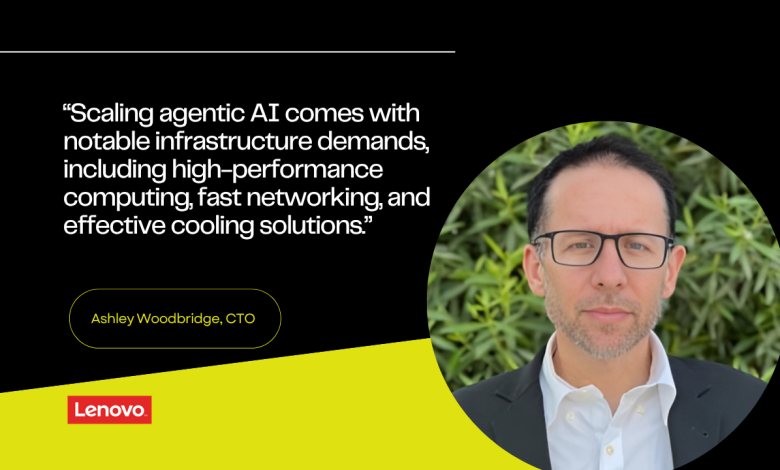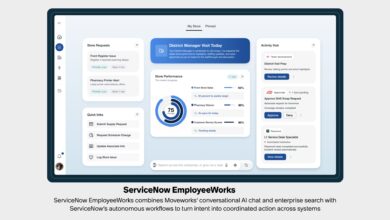Agentic AI: A Combination of Open-Source and Enterprise Platforms Can Deliver Real-World Value

Ashley Woodbridge, the CTO of Lenovo Infrastructure Solutions Group for META, says, AI systems can work on their own within well-defined limits, but they pass on any decisions involving ethical considerations, significant consequences, or legal implications to human teams
How do you define Agentic AI, and how does it fundamentally differ from traditional chatbots or rule-based automation?
Agentic AI represents a major shift in how we think about artificial intelligence. It is built to reason, plan, and act independently within defined parameters to achieve specific objectives. This contrasts with traditional chatbots and rule-based automation, which operate on fixed scripts and decision trees. Where earlier language models could only respond based on training data available at a specific point in time, agentic AI can assess its environment in real time, access tools and APIs, evaluate multiple options, and adapt its actions based on context.
At Lenovo, we view this as a move from managing isolated tasks to coordinating complete outcomes. This shift enables systems to proactively solve problems, optimise processes, and extend operational capabilities while staying aligned with company policies and governance. It is not just about efficiency. It is about enabling scale, responsiveness, and innovation. We see a future where enterprises deploy hundreds of specialised agents, each focused on a particular function, interacting between each other with varying levels of human involvement to drive meaningful results.
Beyond task automation, what complex, multi-step problems are agentic AIs uniquely positioned to solve that current AI models cannot?
Agentic AI is particularly effective at tackling complex, multi-layered challenges that are goal-oriented and require a deep understanding of context and the ability to adapt dynamically. With properly implemented Model Context Protocol (MCP) systems, one of the most underestimated transformative use cases is the democratisation of data analysis across the enterprise. This shifts the value of agentic AI from isolated efficiency gains to enabling intelligence at scale. Teams across legal, operations, and finance can benefit. Legal can stay ahead of regulatory changes across jurisdictions. Operations can track upstream and downstream signals in the supply chain. Finance can identify the root causes of performance shifts within specific business units or markets.
This is not about building another dashboard. It is about deploying intelligent agents that can surface insights, generate hypotheses, and take action across systems, using shared context and real-time data. For this to succeed, organisations must act now. Data quality, accessibility, and governance are the foundations. Without that, even the most advanced agent frameworks will underperform. The data estate is what enables agentic AI to evolve from reactive tools to strategic systems. Businesses that recognise this early will lead the next wave of enterprise transformation.
How much autonomy should Agentic AI have in decision-making, and where should humans remain in the loop?
The autonomy of AI systems, which can act independently, needs to be carefully controlled to strike a balance between being efficient and maintaining human supervision. At Lenovo, we support a “human-centered autonomy” approach. This means AI systems can work on their own within well-defined limits, but they pass on any decisions involving ethical considerations, significant consequences, or legal implications to human teams. For instance, in cybersecurity, an independent AI can automatically detect unusual activity, block threats, and start fixing issues, but humans make the final call on important cases.
Similarly, in customer service, AI can manage routine tasks, while more complicated issues are directed to human staff. This combined method ensures that AI supports human abilities without compromising responsibility or trust. Governance structures, like Lenovo’s Responsible AI guidelines, are essential in setting these limits, making sure AI autonomy matches the organisation’s values, legal standards, and what stakeholders expect.
What infrastructure challenges (such as power, cooling, latency) arise when deploying Agentic AI at scale?
Scaling agentic AI comes with notable infrastructure demands, including high-performance computing, fast networking, and effective cooling solutions. The computational demands of training and operating agentic AI models necessitate advanced hardware, like NVIDIA Blackwell GPUs, which Lenovo incorporates into its ThinkSystem servers. Energy consumption poses a significant challenge, particularly in data centers that operate ongoing AI workloads.
To tackle this, Lenovo uses Neptune liquid-cooling technology, boosting energy efficiency while ensuring top performance. Low latency is another essential consideration, especially for real-time applications such as cybersecurity or deployments in healthcare at the edge. Hybrid AI frameworks, which mix edge, cloud, and on-premises processing, reduce latency by supporting localised inferencing. Moreover, Lenovo’s AI Factory platforms improve deployment and scalability, providing modular, validated designs that simplify infrastructure integration while maximising resource utilisation.
What’s the next frontier for Agentic AI—will we see AI “agents” collaborating like human teams?
The future of AI that takes initiative lies in working together collaboratively, where various AI units join forces to reach complex goals, similar to how human squads operate. These units will focus on specific area such as analysing data, making decisions, and carrying out tasks—and will communicate effortlessly to synchronise their activities. For instance, in the manufacturing sector, one unit might oversee supply chain logistics while another improves production schedules, all working together to ensure operational efficiency.
Lenovo is already investigating this model with our AI Knowledge Assistants, which incorporate a range of functions to improve business workflows. As standards for working together are refined, we expect the development of “agent ecosystems,” where AI units from different companies cooperate across shared platforms. This advancement will redefine collaboration, merging human creativity with machine accuracy to drive innovation and address global challenges.
Will open-source models keep pace with proprietary Agentic AI systems, or will there be a widening gap?
Open-source models remain foundational to the agentic AI ecosystem. Many of the frontier capabilities that power today’s most advanced systems originate in open research communities. These models drive innovation, experimentation, and accessibility across a broad range of use cases.
However, building a production-grade agentic AI system requires more than a strong model. It demands orchestration, governance, and reliability across the full stack. This is where enterprise solutions such as Lenovo’s Hybrid AI Advantage come into play. By combining open-source model flexibility with integrated infrastructure, security frameworks, lifecycle management, and compliance controls, these solutions provide the guardrails needed to de-risk deployments and ensure enterprise readiness.
Rather than a widening gap, what we are seeing is a layering effect. Open models power the core intelligence, while enterprise platforms shape them into scalable, secure, and governed systems. Lenovo is committed to supporting both sides of this equation. Through contributions like the Lenovo AI Library, we continue to provide access to curated open models and reference use cases, enabling organisations to accelerate adoption while maintaining control and compliance. The future of agentic AI will depend not on one approach over another, but on how effectively open-source and enterprise platforms are combined to deliver real-world value.




